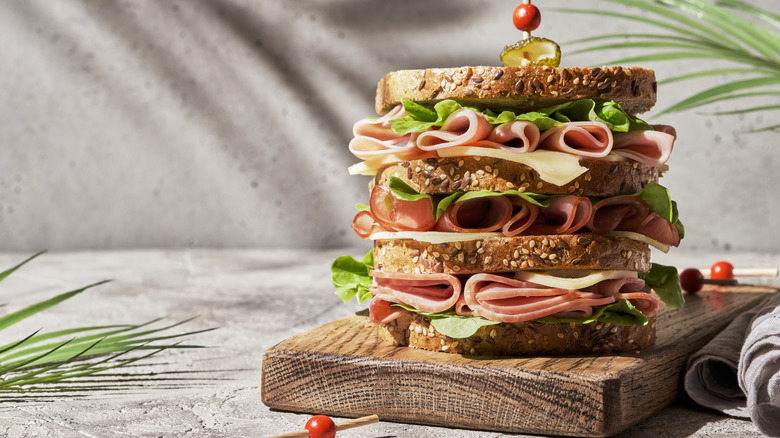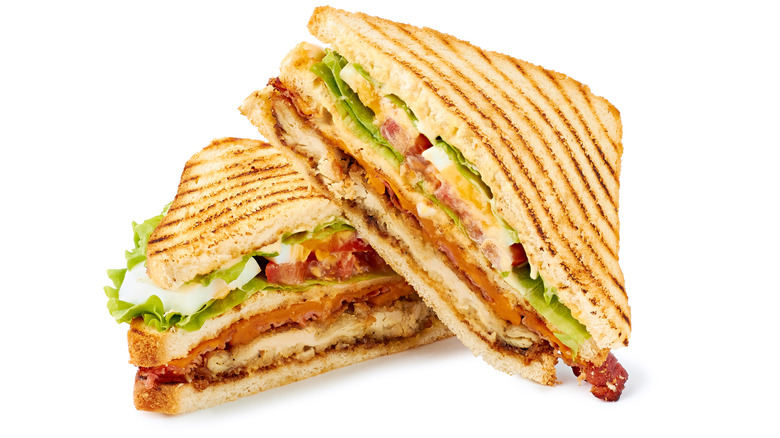Why James Beard Hated The Modern Club Sandwich
The club sandwich — simple, but a classic. Some say it's just a fancy BLT but it was once described as "the quintessential American dish" by esteemed food critic James Villas (via Town & Country). A good club sandwich shouldn't be complicated: All you need is bread, lettuce, tomato, mayonnaise, bacon, and turkey. With a recipe this simple, it can't have changed that much, right? Not according to James Beard, a man who hated the modern version but loved what he claimed was the original. For culinary purists like Beard, the modern-day club sandwich is a tainted version of the original recipe, and the changes made to it (mainly its increased height and layers, and the ideal meat used) moved away from what he thought was the original.
For those unfamiliar with Beard, he was dubbed the "Dean of American cookery" by the New York Times in 1954 (via the James Beard Foundation) and is credited with providing much of the energy that spurred America's food revolution in the post-war years. The James Beard Foundation describes him as a "pioneer foodie" and he became one of the first TV chefs back in 1946 when the technology was still new. Yet despite his culinary pedigree and prowess, Beard might not have been exactly right about the club sandwich; there's some uncertainty about what exactly the original club sandwich recipe was, which means some of the changes Beard hated so much might not have actually been changed at all.
A three-decker bastardization
Beard didn't pull his punches when it came to club sandwiches and felt that one of America's best culinary exports had been all but ruined. The two main reasons he hated the modern-day version were, as you probably guessed, the bread and turkey. In his cookbook "James Beard's American Cookery" published in 1972 (via What's Cooking America?), he said this about the Club sandwich growing taller: "Nowdays the sandwich is bastardized because it is usually made as a three-decker, which is not authentic (whoever started that horror should be forced to eat three-deckers three times a day the rest of his life)."
Anyone who has attempted to eat an overly stacked triple-decker club sandwich knows how difficult it can be to hold together, and what a serious punishment Beard was suggesting here. But it wasn't just the aesthetic or structural changes Beard hated. As one of the godfathers of American cooking, he also had some taste concerns, taking issue with the use of turkey. Again, in his cookbook, he wrote, "Nowadays practically everyone uses turkey and there's a vast difference between turkey and chicken where sandwiches are concerned." Though many only know the club sandwich made with sliced turkey (which is still great) Beard preferred it with chicken and claims the use of turkey moves away from the original recipe.
Where did it all go wrong?
But is that right? When was the club sandwich bastardized — if it ever was? It's hard to say because there's historical debate about when exactly the club was invented and what the original recipe was. Some say it was first invented in 1894 at a gentlemen's club in upstate New York. Others say it was born a few years later in New York City at the Union Club. Interestingly, an 1889 article in New York's Evening World newspaper claimed the recipe called for "a layer of turkey or chicken," and the oldest known recipe published in Good Housekeeping 1903 also stated that it could be made with "a slice of the white meat of either turkey or chicken." So James Beard might have been wrong about this one.
As for the layers, some historians claim the club sandwich was created for the double-decker "club trains" of the early 20th century (via Fine Dining Lovers), but, according to historians for the U.S. House of Representatives archives, by the time it was being debated in the House of Representatives in 1930, the sandwich had become a triple-decker. In that particular debate, the sandwiches being compared were made with chicken, Beard would be happy to hear.
So it's unclear exactly how (or when) the club sandwich started moving away from its origins, and it's unclear if there ever even was an original recipe. So it seems that Beard may have been right about the bread but wrong about the turkey. If he were to see some of the thick, turkey-laden, triple-decker club sandwiches of the 21st century, he would no doubt hate them too.


